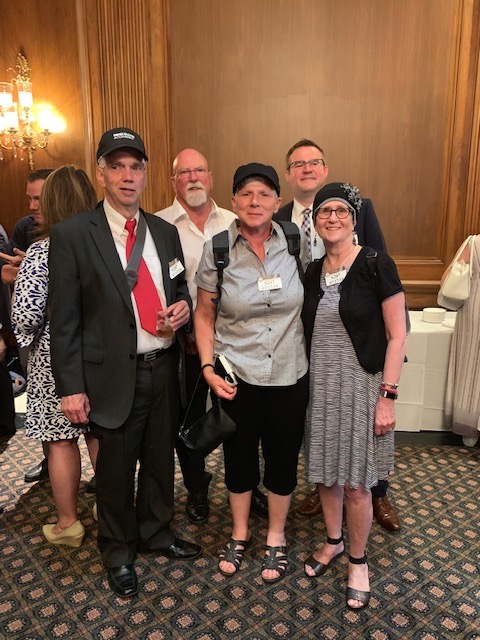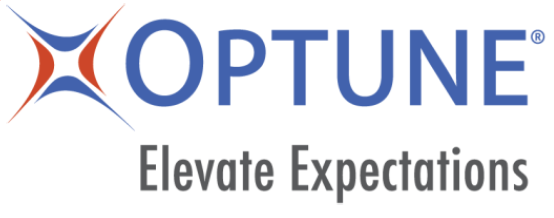September 13, 2019
Optune® Ambassador Program – Patient Story – Eric


Written by Optune® Ambassador Eric C.
My father used to say to me when I was a kid, “Eric, don’t be helpless.” Throughout my life I have often reflected on his words when facing difficulties, but especially since receiving the glioblastoma (GBM) diagnosis. I’ve had my share of upsets, but who hasn’t? Really, I just tend to believe that life is defined more by how one copes than by what one must cope with.
Hi, my name is Eric, and I am here to share my story about how I live my life with Optune. I’d like to thank Novocure for making it possible for me to be a part of this program today.
I have always thought of myself as a lucky guy. I was born to amazing parents and raised in a wonderful midwestern utopia. Everything was like a picture-perfect 1950s TV show, where the dad was calm and strong, and the mom managed the household and the kids with grace and certainty. My dad was not a harsh or strict disciplinarian, but the thought of disappointing him was never—and still is not—acceptable in my psyche. It gets even better! I met the love of my life when I was in junior high, and we have been married many years and are still going strong. She actually was “the girl next door” because she literally lived next door.
Then, in 1979, when I was only 26 years old, my gentle and kind father died due to complications from encephalitis. He was safely on the road to recovery after surgery to relieve the pressure on his brain when he suffered a pulmonary embolism. To this day we have no idea how he contracted the illness. We were all devastated. It was a gigantic loss in my world. No one has had a bigger influence on the way I view life than he did. I continue to consciously make significant decisions based on what I believe he would have done.
It was a hot July day. I was ironing my shirt (yes, it’s true) before heading out the door for the airport—business trip—when my wife stopped me and said, “You look terrible.” “Thanks, dear,” I thought, trying to ignore her worries—I was already uncharacteristically behind schedule and just wanted to get going…but she was insistent and asked me for my car keys in order to take me to the emergency room. At the time she thought I might be having a stroke because my face was distorted, and my speech was slurred. We called our daughter who is a nurse and she told us to get to the hospital right away, too. I gave in to them both and handed over the keys.
Two hours later, when I should have been sitting in a business meeting in another state, I was instead sitting with a doctor who was telling me that I had a large brain tumor that needed to be removed immediately. Needless to say, my wife and I were in shock. Breakfast to brain tumor, and all before lunch. The neurosurgeon put me on steroids for three days in order to reduce the swelling and then off to surgery I went.
I told you I was a lucky guy. The operation went very well, and the doctors were happy, which made me feel better. But I also received the official diagnosis of GBM and was given a slew of information about what to do next and what to expect. I met with a neurologist, a radiologist, an oncologist, you get the gist, and soon began the intense radiation and chemotherapy treatments. This is also when I was introduced to Optune, which I was able to start using about two and a half months after my surgery.
My doctor explained to me that Optune is a wearable, portable, FDA- approved device intended as treatment for adult patients with GBM. He also explained that Optune uses alternating electric fields (TTFields), which may slow or stop cancer cells from dividing. We talked about the most common side effects involving Optune in combination with temozolomide (TMZ), which are low blood platelet count, nausea, constipation, vomiting, fatigue, scalp irritation from device use, headache, seizures, and depression. Despite my technical abilities as a trained engineer, it was a lot of information to digest. So much had happened so fast.
I have to say that I had not been experiencing any obvious symptoms of GBM. I had not had any headaches, no seizures, no tremors. Though, once diagnosed, my wife and I began to recall some subtle changes in my behavior. I am an engineer, and have always been organized, prompt, attentive to detail, and very responsible and logical. Still, during the few weeks prior to that fateful hot summer day, there were some indications that were easy to ignore at the time. I was increasingly nonchalant about paying bills, being on time, and other responsibilities. I used the excuse that I had always been perfectly on top of everything so if I am off a little who cares. After a lifetime of being one way, it was definitely not normal, but easily dismissed.
Then came the day I began using Optune. My wife and daughter were with me when my nCompassTM Device Support Specialist (DSS) came to get me started. nCompass is a support program provided by Novocure. I cannot express enough how wonderful my DSS and the nCompass team have been. I was taught how to arrange the arrays, how to shave my head properly using the razor provided, and how to manage the alarms. It is recommended to use Optune for 75 percent of the time, which equates to 18 hours a day. I use it every day, and while I remove it when I am golfing, or when I do an array change, I regularly exceed the recommended 75 percent monthly usage rate. My wife and I change the arrays every two–three days depending on their condition, my perspiration, and the weather. I still work, with my doctor’s permission. I travel for my job at least two weeks a month. I fly often, and while I should probably allocate more time for security to make things even easier, I have really had no issues.

My wife has been amazing. I couldn’t be luckier in the woman I chose to marry. She doesn’t just accept my failing short-term memory or diminishing mental organization skills. Instead, she challenges me to do better. In maybe her unintentional way, she provides the incentive to keep “fighting,” whatever that term is supposed to mean. For instance, I once left my wallet at a restaurant and only realized it about 100 miles later—sure, people do this sometimes, but it was absolutely unusual for me. I drove 100 miles back where luckily my wallet was safe and secure, but it was quite an ordeal and, as I said, unlike me. It was a frustrating experience, but it turned out okay in the end. Things like this happen from time to time. Still, I don’t want to be helpless and my wife inspires me to keep strong. We’ve been together for so many years and our partnership attests to the vow in sickness and in health.
I made a decision right from the start that I was going to do what I planned regardless of the GBM diagnosis. My wife and I were planning to move into a new home, which we did. As luck would have it, my two daughters moved back to our town from far-flung parts of the country before my health matters appeared. Our new house is in the middle of the two, and it is a seven-minute walk to either set of grandkids. I plan to retire on schedule, and I am sticking to my original timing. Again, I am lucky to work for a firm that is patient with my health issues. They allow me to set my goals and targets to fit within my revised capabilities and desires. They couldn’t be better in trying to accommodate my situation. I must get regular MRIs, and so far, the results have been good. I feel good, too, and I won’t stop unless I must. I respect numbers and statistics, but where my own life is concerned, I won’t be defined by them.
I’m very happy with the whole Optune experience. I feel lucky to have a good relationship with nCompass. It is a partnership, and I feel very supported.
My career, my family duties, and my active lifestyle have always been integral to who I am as a man. The day you’re diagnosed with GBM it’s difficult not to feel “helpless,” and so many instances through the subsequent months really confirmed it. I carry the words of my dad with me every day, especially in this fight for my health.
I am lucky. I have my family near me, and it is so much like the way it was for me when I was a kid. I am still able to be out in the world. Able to work and lead. Able to travel and participate in life. The seeds that my parents planted continue to grow through me and my children. I suppose it is easy to feel helpless when you are told you have GBM, but I choose a different approach. I thank my dad for preparing me to face life’s challenges head-on.
I thank my wife and children for their love and support. I am not helpless. I am not hopeless.
I thank you all for listening.